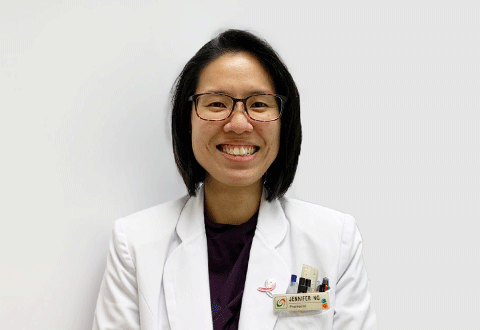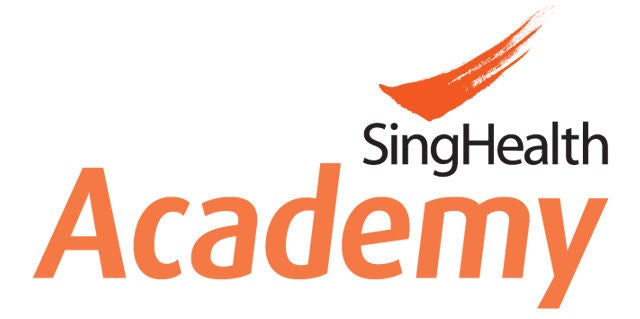
Dr Jennifer Ng Kim Yoke
Senior Clinical Pharmacist, National Cancer Centre Singapore
Alumna of the National Pharmacy (Haematology/Oncology) Residency Programme (2020)
Jennifer has a special passion in the area of oncology and had completed her PGY2 pharmacy residency in oncology in 2020. She is now a senior clinical pharmacist at the National Cancer Centre Singapore (NCCS). She runs several clinical services including pharmacist-run clinics, where pharmacists assess patients for their fitness for chemotherapy and assist patients in their management of chemotherapy related side effects. Jennifer is also part of the Pharmacy and Therapeutics Committee of her institution where she is actively involved in reviewing clinical data for safety, efficacy and cost-effectiveness of new chemotherapy agents before they are included into the institution formulary.
In this session, we speak to Jennifer to discover more about her experience as a resident and how residency had helped her advanced her clinical practice.
-
What made you pursue a career as a pharmacist in oncology?
Oncology is like an “acquired taste”, and it is a rapidly evolving specialty which makes it challenging yet exciting at the same time. I felt that there are many ways in which pharmacists are able to make use of our skills and knowledge to help patients in their treatment journey. This includes ensuring that their treatment and supportive care regimens are appropriate and drug-related problems are resolved. Pharmacists can also participate in translational clinical research and quality improvement projects to help improve our care for our patients. -
What were your main reasons for taking up residency in oncology?
Shortly into my journey as a pharmacist, I had the intention of specialising in oncology. After 8 years into my career and 1.5 years after completing Pharm.D., I embarked on the residency programme. I find that PGY2 is a structured 1-year programme that allows for 100% hands-on training at various oncology/haematology centres across Singapore. The hands-on nature of the programme is something I look forward to because it is how I learn best. Apart from clinical skill sets, residency also provides opportunities for teaching, research and leadership. Residency is also an invaluable platform for interacting and working with other oncology-trained specialist pharmacists/healthcare professionals at other institutions, which helps to broaden my horizon on clinical practice pertaining to oncology. -
In your opinion, how is residency different from “on-the-job” training? How does residency help in advancing your clinical practice?
Residency allows for dedicated time to focus on the training, without interruptions or interference from daily operational work. Oftentimes, I am forced to step out of my comfort zones. For instance, I have only been involved in the management of adult patients at NCCS but the residency programme gave me opportunities to learn about paediatric oncology during my stint at NUH, among many other exposures. The valuable experiences from residency further built my competency and I am now more equipped to take on new challenges. -
Where did you do your national residency and what does a typical day during residency look like?
Apart from my training at NCCS, I was also rotated to SGH, NUH and Assisi Hospice. A typical day at residency starts with attending ward rounds with a multi-disciplinary team in the morning, followed by reviewing the medication list of patients under my care. Afternoons are often dedicated to joining doctors/other clinical pharmacists at the clinics, counselling patients on their medications/chemotherapy and discussions with my preceptors or self-study. -
What were some of the challenges you faced as a resident?
The major challenges would be to handle the steep learning curve, and also being able to cope with stress and prioritise my time well. Also, due to the COVID-19 pandemic, I often had to deal with unexpected changes in schedules and restrictions which could be rather disruptive to my learning routine. Lastly, I had to learn how to manage my own expectations to ensure that my learning experience is optimised. -
What is your advice to fellow colleagues/juniors who are uncertain about entering into residency?
If the intention is to specialise in oncology, then residency is the way to go. Although it can be an intensive 1-year programme, what you gain in experience, knowledge and skills is worth the investment of your time and efforts. Nonetheless, completing residency does not equate to being a certified or proven specialist in all the rotations we have been through. It just makes us more ready to take on and tackle what we were previously not so comfortable with.
It is important to know that embarking on residency is a commitment to yourself and to all the people involved in the training. Hence, one has to be very sure of what you intend to pursue before applying for it. Overall, I believe in the saying that “Nothing ventured, nothing gained”.
This interview is the first in a series to introduce the SingHealth Allied Health Residency Programmes and is facilitated by the SingHealth Allied Health Residency Steering Committee and SingHealth Academy College of Allied Health (CAH).
















